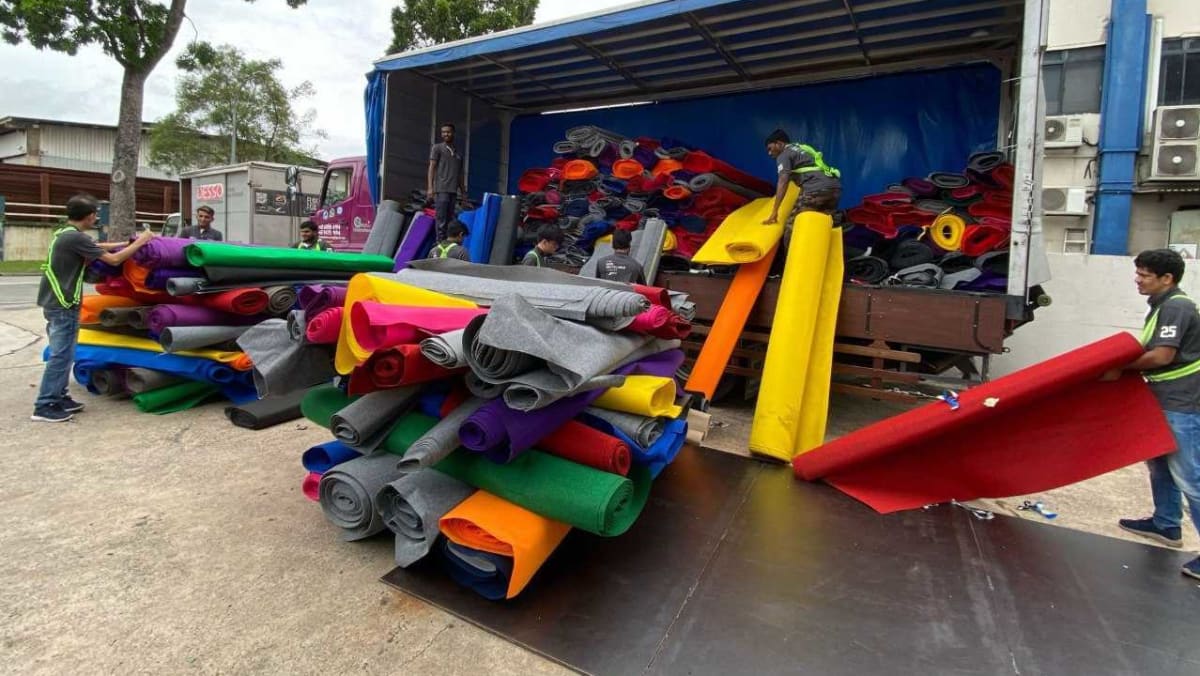When Ms Tasnia Saba Tisha started to do her own nails to pamper herself after her O-Levels amid a raging pandemic, never did she imagine that it would soon lead to her doing manicures for clients coming to her from as far away as New York and Italy – all from the comfort of her bedroom.
Having sharpened her skills in the past three years through online tutorials, the now 21-year-old undergraduate balances university with running Saba Hub, her home-based nail salon in Jurong West.
During festive seasons like Christmas and Chinese New Year, she sees up to four clients at her flat a day, with sessions sometimes lasting over two hours, depending on the complexity of the design.
“When I was in polytechnic, I was so passionate about it, I used to do manicures on weekends,” said Ms Tisha.
Although she sees herself as a “small player” in a crowded home-based nail salon market, Ms Tisha said clients return due to her competitive pricing.
She charges S$40 to S$100-plus for more intricate hand-painted nail art gel manicures, while some brick-and-mortar nail salons she has seen charge over S$100 for a plain colour manicure.
Offering flexible appointment slots and no upselling, customers can enjoy a relaxed atmosphere in her bedroom, watching Netflix on Ms Tisha’s laptop while having their nails done.
While it’s no secret that the COVID-19 pandemic was boom time for micro-entrepreneurs like Ms Tisha, with many picking up new skills or turning hobbies into businesses, the cottage industry continues to thrive.
Some people are even leaving long-time careers to focus on scaling their side hustles into full-time enterprises.
Take Cheeky Don, a home-based Japanese food business started in 2023 by chef Jacky Tan, which specialises in “truly Singapore donburi”.
After noticing a decline in demand for services at his marketing consultancy — an industry he had been in for 20 years — partly due to the emergence of artificial intelligence, Mr Tan took a leap of faith and pursued his pork jowl rice bowl business full-time.
“I started learning to cook during COVID. The first two months (of Cheeky Don), I was very worried, but when I received my first customer, I was so happy,” said Mr Tan, 43, who added that the highest number of orders has been 30 a day thus far.
He has even had to turn away customers who showed up at his Hougang estate after chancing upon reviews for the business on Google, but didn’t realise that Cheeky Don is a home-based business, not a physical restaurant.
While some home-based businesses started as a means of economic survival during the pandemic, many continue to thrive even as COVID-19 with all its restrictions have faded into the background.
But can these micro-businesses survive in the long term, with their charm rooted in being small and personal? Or do they need support to scale up and professionalise in order to ensure their staying power?
In conversations with over 10 bakers, artisans, and service providers, CNA TODAY explores the vibrant world of home-based businesses and how these ventures are redefining the concept of working from home.
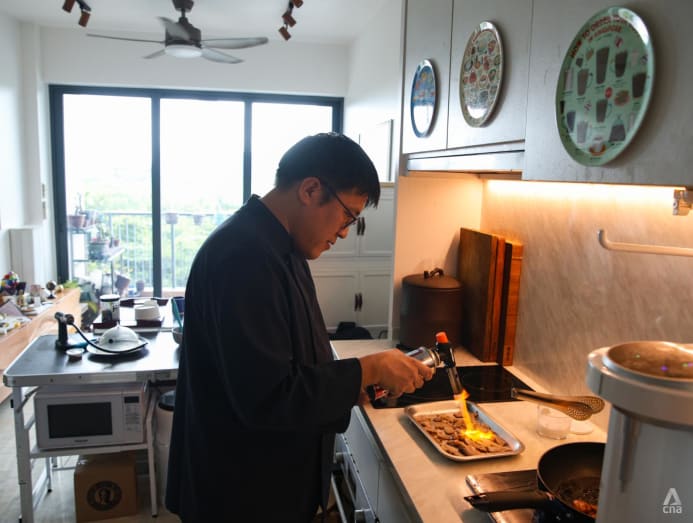 Mr Jacky Tan is behind home-based business Cheeky Don, selling pork jowl rice bowls from his home. (Photo: CNA/Nuria Ling)
Mr Jacky Tan is behind home-based business Cheeky Don, selling pork jowl rice bowls from his home. (Photo: CNA/Nuria Ling)
CHANGING MOTIVATION FOR HOME-BASED BUSINESSES
While there are broad guidelines, the regulatory oversight of home-based businesses is limited and varies by the type of work involved.
Additional licences and recommendations are often field-specific, creating a patchwork of compliance requirements, and there is limited data on this multifaceted cottage industry.
In a 2021 written reply to a parliamentary question, Minister for Sustainability and the Environment Grace Fu said that the Housing and Development Board (HDB) and the Urban Redevelopment Authority (URA) do not have records of the number of home-based businesses in Singapore, as approval is not required for these activities.
In a joint response, HDB and URA said: “In general, most small-scale home-based businesses have been able to co-exist peacefully with their neighbours and are adhering to the conditions of the scheme. HDB and URA will carry out the necessary investigations when feedback is received against home-based businesses."
THE HOME-BASED BUSINESS SCHEME
In Singapore, two primary schemes facilitate business operations from a residential dwelling: The Home-Based Business Scheme and the Home Office Scheme.
Introduced in the 1980s, the Home-Based Business scheme, which is overseen by HDB and URA, allows for small-scale home-based business activities to carry on without prior approval, within certain conditions of use. These are:
- The business must be operated by owners, registered occupants or tenants without hiring third parties or non-resident employees
- No advertisements, posters or signages can be displayed at the residence
- Business activities must not cause disamenities to one’s neighbours, such as “extraneous traffic” or noise, smoke, smell
- No use of heavy equipment or appliances not intended for domestic use
- No large-scale storage or frequent loading and unloading of goods
Ultimately, the flat or property must still be primarily used for residential purposes and not converted to commercial outlets. Should business activities cause disamenities to neighbours, they may be required to cease operations or relocate to a commercial unit.
In response to CNA TODAY’s queries, HDB and URA said that they will carry out necessary investigations when feedback is received against home-based businesses, though most cases have revealed that the premises remain primarily as a residential dwelling without “material change of use”.
For HDB flats, feedback typically centres around noise disturbances due to increased foot traffic, while in private residential properties, feedback typically relates to noise, smell, food hygiene concerns, and traffic or parking issues.
Additionally, home-based food businesses must adhere to specific recommendations by SFA, such as the prohibition of the selling of ready-to-eat raw seafood.
The SFA takes a "risk-based approach" in regulating food businesses, and home-based food businesses are currently not required to be licensed as the food safety risk is limited by the scale of their operation.
While there is no requirement to be licensed, home-based food businesses have to comply with food safety requirements and SFA can take enforcement actions in the event of food safety breaches.
The agency has taken 19 enforcement actions against home-based food businesses since 2021. These were mostly in relation to prohibited activities such as home-based food businesses providing catering services, or licensed food establishments selling food products prepared by home-based food businesses.
As for the Home Office Scheme, it allows for two non-resident employees to be working from a residence, and requires the resident to obtain relevant HDB or URA licence before starting business.
Some examples of small-scale office activities that fall under this scheme include accountancy services, design services and real estate agencies.
Collapse Expand
Associate Professor Lau Kong Cheen from the Singapore University of Social Sciences (SUSS) pointed out that data is limited as a person does not need to register a business with the Accounting and Corporate Regulatory Authority (ACRA) if they use their own or their partner’s exact full name, as stated in the NRIC, as the business name.
Despite the limited data, experts agreed that the home-based business sector peaked during the pandemic as households looked for creative alternative sources of income.
Interest in this business model has grown in recent years, in part due to consumer preferences shifting towards supporting local businesses and a growing familiarity with online shopping.
Home-based businesses are an “integral part” of Singapore’s economy, providing opportunities for entrepreneurship and contributing to its economic diversity, said Mr Joe Escobedo, an adjunct lecturer from the department of marketing at the National University of Singapore (NUS) Business School.
As entrepreneurs have embraced online platforms for customer engagement and sales, it is natural that these “resilient” home-based businesses with low overhead costs and flexibility will sustain their momentum past the pandemic, he added.
Assoc Prof Lau noted the motivation for such businesses has evolved “from survival during the pandemic to one of personal passion and ambition”.
“Those with a passion to hone their skills such as baking, cooking, personal coaching, tuition… can utilise home-based businesses as a test bed for their venture and to build up their brand,” he said.
Agreeing, Mr Melvyn Suan, director of the Singapore Institute of Retail Studies at Nanyang Polytechnic, said home-based businesses have pivoted away from food to other industries including beauty and wellness services, artisanal crafts, online tutoring, digital services and even pet-related businesses.
“As flexible work arrangements become more common, the home-based business trend is expected to grow, contributing to a vibrant and diverse entrepreneurial ecosystem in Singapore,” said Mr Suan.
Dr Abdul Malik Hassan, vice-president of the Singapore Malay Chamber of Commerce and Industry (SMCCI) and chairman of the SMCCI Academy said the non-profit organisation has witnessed a "significant evolution" in home-based business sector, with many owners becoming more open to capability training and upskilling themselves.
Its academy has run four business fundamental programmes in 2024, each time engaging about 15 home-based business owners to help them manage their limited visibility, financial constraints and lack of professional networks.
The organisation plans to help more home-based businesses build "sustainable success" in 2025 with the introduction of new programmes, including financing initiatives aimed at transforming high-potential home-based businesses into scalable small and medium enterprises.
 Ms Tasnia Saba Tisha, 21, a university student who runs a home-based nail salon from her bedroom. (Photo: CNA/Nuria Ling)
Ms Tasnia Saba Tisha, 21, a university student who runs a home-based nail salon from her bedroom. (Photo: CNA/Nuria Ling)
LOW COST, FLEXIBLE WORK “DREAM”
When Ms Heni Sugiyarti, 33, first launched Heni Bakes under Project Kukoh in 2020, she saw it as a temporary way to supplement her household income as her husband had been declared permanently unfit to work because of health issues.
The project is a community initiative designed to empower stay-at-home mothers in the Jalan Kukoh rental flat estate near Chinatown during the pandemic.
At the time, she had no idea that her brownies would not only attract a customer base of 600 but also establish her as the primary breadwinner of her family of seven.
Ms Heni has since expanded her menu to include basque cheesecakes, pineapple tarts and even a custom order of healthy muffins for a regular expatriate customer. Her menu starts at around S$21 for a half pan of brownies, to 10-inch whole cheesecakes for around S$60.
She attributed her success to her commitment to quality. As a small-batch baker, she is able to use premium ingredients such as high-quality butter and chocolate, without having to worry about other overhead costs, such as rent for a commercial space. She is also quick to respond to customers’ text messages, and can make customisations based on their allergies or preferences.
“My brownies are very fresh, I make them on the day itself,” said Ms Heni. “Customers always ask me, ‘Why when I buy brownies from other places, it’s very cold?’ Some other places, they take it out of the refrigerator when there’s an order (because they bake in advance).”
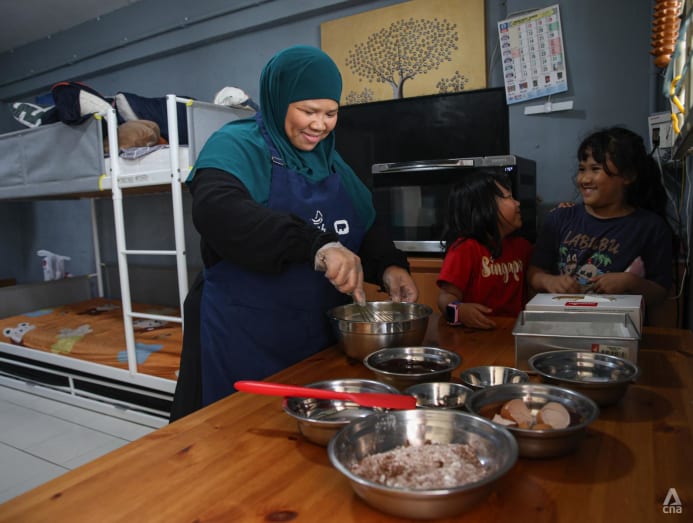 Ms Heni Sugiyarti runs Heni Bakes from her rental flat at Jalan Kukoh estate. (Photo: CNA/Nuria Ling)
Ms Heni Sugiyarti runs Heni Bakes from her rental flat at Jalan Kukoh estate. (Photo: CNA/Nuria Ling)
Business is good, says 36-year-old Fairuz Almuddin who runs Indonesian-style meatball noodles business Bakso Bibik Podas. Her income fluctuates from month to month, averaging at about S$8,000 during festive seasons and dipping to S$2,000 in slower periods.
The figure also includes her earnings from a Shopee parcel collection point she runs at her home, which gives customers the option to pick up parcels and save on delivery fees. She earns around S$0.30 a parcel and receives around 100 parcels a day.
For some others, business is so steady that they have even expanded slightly outside the home, be it at pop-up stalls or renting external storage for inventory, as Ms Vivien Tan, 49, founder of The Cotton Shoppe, has done.
Her personalised baby and pet gifts home-based business has sold custom-made items and fabric to sewing enthusiasts since 2013. Last year, Ms Tan decided to take out external storage for her goods to declutter her home, even as having a retail store remains out of reach.
Mr Danny Wong, the chief executive officer of Work+Store, said that the company has seen a “huge boom” in home-based businesses seeking self-storage solutions since the pandemic. Many of his clients are “one-man shows” who prioritise cost-efficiency.
“Many of them simply need an extra room to store their goods … but are unable to turn to traditional warehouses that only offer big space sizes of 500 sqft and above with fixed lease terms of two to three years,” said Mr Wong. He added that home-based businesses typically seek storage spaces about the size of one HDB bedroom.
His company offers a wide range of space size options, and business owners have the option to upsize during festive seasons when demand is high and they have to store more goods.
Besides the lower barriers to entry in terms of operating costs, running a home-based business also offers the owners — from teenagers to retirees — a flexible working life.
One of them is 73-year-old Paulin Khoo, who traded retirement for the art of coffee making and becoming a barista at Kopikhoo, a coffee kiosk carved out of an exterior wall of her home’s kitchen.
Conceptualised by her son, who was inspired by other home-based food and beverage businesses and cafes in their Joo Chiat neighbourhood, Mrs Khoo has been serving everything from mochas to iced caramel lattes from a window overlooking an alley since June 2024.
While profit fluctuates – Mrs Khoo said that she can sell over 100 cups on a weekend but only 20 on slower weekdays – running the kiosk has given her a chance to stay active in her silver years and stay close to her family and five grandchildren.
“Running a business in the comfort of your own home is very different. Anytime I want to rest, I put a bell and go to the room to rest for a while,” she said. “I never dreamed at my age, there is a home-based business for me to receive so much joy and meet a lot of people from all over the world.”
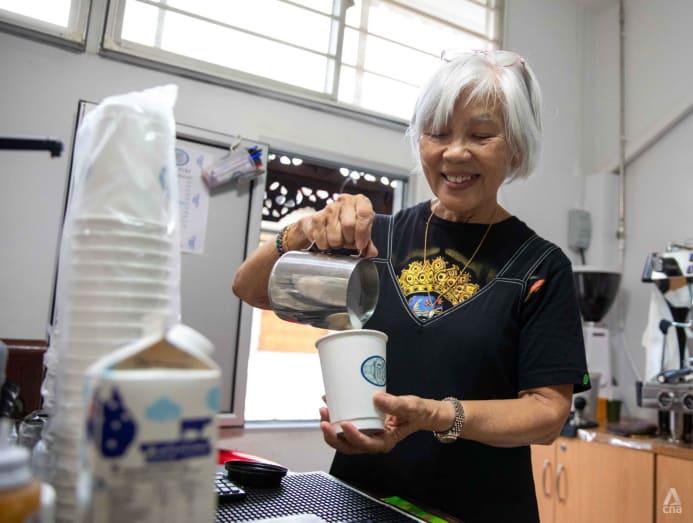 Mrs Paulin Khoo is a barista at Kopikhoo, a coffee kiosk carved out of an exterior wall of her home’s kitchen in Joo Chiat. (Photo: CNA/ Lim Li Ting)
Mrs Paulin Khoo is a barista at Kopikhoo, a coffee kiosk carved out of an exterior wall of her home’s kitchen in Joo Chiat. (Photo: CNA/ Lim Li Ting)
As for Ms Prema K Kelu, 68, providing bespoke tailoring and alteration services at three-year-old Bab’s Tailoring from her Yishun flat is also a “dream” as she can balance taking care of the family and gain additional income from a skill she had picked up as a teenager.
“In my younger days, what I sewed was simple things like blouses, but now I am doing complicated patterns that I can learn from Google or YouTube,” said Ms Kelu.
Demand is strong for her ready-made sarees, as customers appreciate the convenience of being able to buy and alter their clothing in the heartlands, as well as the personalised quality of the work, she added.
MORE COMPETITION, LESS DEMAND
But it is not all a bed of roses for these small businesses. Apart from a drop in demand post-pandemic, many business owners also face perennial challenges like managing work-life balance and losing some of their privacy amid a steady stream of customers and suppliers to their homes.
Home-based businesses also need to be mindful that their operations do not inconvenience neighbours.
Ms Julianna Lim, a 37-year-old sales director who is Mrs Khoo’s neighbour and a regular customer at Kopikhoo, acknowledged that some neighbours were initially concerned about noise and increased foot traffic in the vicinity.
But Ms Lim said the overall sentiment in the neighbourhood has been supportive, which she largely attributed to the transparency and openness shown by Mrs Khoo and her son while setting up the business.
“A lot of people, especially those who work in the corporate world, have a dream to set up a cafe and sell coffee. To see (your neighbour) be able to live that dream, I think it’s fantastic,” she said.
Over at BaanAhChew Private Dining, a communal-style Thai dining experience, chef and owner Max Chew Min Xiong Wittawat ensures that his guests leave before 10pm to minimise any disruption to his neighbours. Group sizes for private dinners range from six to 10 persons in his Redhill home at one sitting.
The 30-year-old Thai-Chinese Singaporean is even designing his next home with his private dining business in mind, such as incorporating sound-proofing. He is moving into his new flat later this year.
While the likes of Mr Chew and Mrs Khoo have been able to integrate their home-based businesses into their communities, they still have other bigger fish to fry, such as increased competition and slowing post-pandemic demand.
When Mr Chew started his private dining business during the pandemic, demand was high due to travel restrictions, which made private dining an attractive option.
“Over the past year, demand has been slowing down because a vast majority of my clients are spending the money overseas... Plus, there are more private dining options now, so people are spoilt for choice,” said Mr Chew.
Similarly, Ms Marhamah Sapandi, 54, owner of halal home-based Japanese food business Inariku, said that while sales tripled during the pandemic, demand has slowed in an increasingly crowded market.
“When I started, there weren’t many halal Japanese food options around, so we had a niche market. After COVID, several non-halal restaurant chains went halal and more home-based businesses began offering halal Japanese cuisine. The market has gotten smaller and we do feel there’s a drop in sales,” she said.
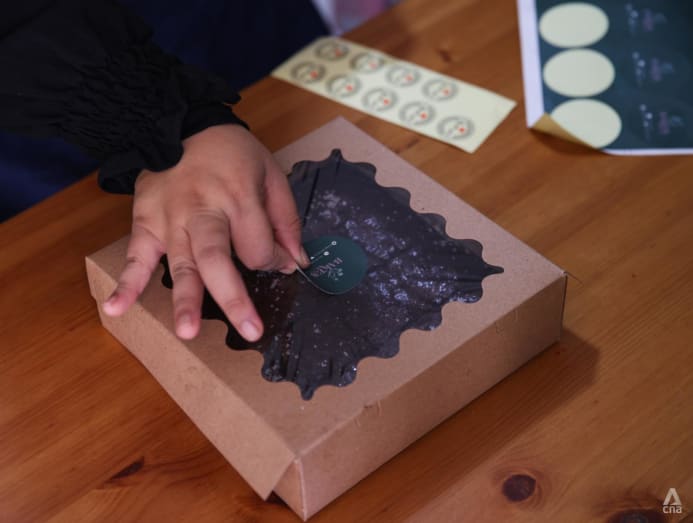 Ms Heni Sugiyarti puts label stickers on a box of brownies. She has expanded her menu to include basque cheesecakes and pineapple tarts. (Photo: CNA/Nuria Ling)
Ms Heni Sugiyarti puts label stickers on a box of brownies. She has expanded her menu to include basque cheesecakes and pineapple tarts. (Photo: CNA/Nuria Ling)
WHAT’S NEXT FOR HOME-BASED BUSINESS?
The home-based business sector has largely been left to thrive on its own, but with rising competition and slowing demand, owners and experts said that more can be done to ensure the sustainability of the sector.
For many, the ability to scale up remains a significant challenge, due to limited capital and various restrictions such as not being able to hire external staff or place any advertisements on their premises.
While social media and rising consumer awareness may have helped level the playing field for small business operators in terms of advertising, the current economic climate presents its own set of difficulties for these smaller businesses, said one expert.
Ms Selena Ling, chief economist at OCBC, said home-based businesses encounter similar challenges to those faced by small to medium-sized enterprises, whose success depends on broadening their market reach, retaining customer loyalty beyond fads and controlling costs.
“The current economic climate may still be challenging if these small businesses cannot scale up and broaden the appeal beyond domestic shores, since the domestic market is relatively small and consumer penchant for novelty may mean their spending dollar is fickle, especially now that overseas travel is back in full swing,” said Ms Ling.
Though home-based business offerings tend to be cheaper, Assoc Prof Lau from SUSS said the competition posted by these businesses is “still weak” due to their scale.
Home-based businesses have to “set the right expectations” for customers due to their limited ability to grow, managing orders so as to avoid disappointing customers.
Still, Assoc Prof Lau noted that the home-based business model will remain attractive for those who have a good product and the social media savviness to gain traction — as long as there are not too many restrictions in housing policies that elevate their cost of operations.
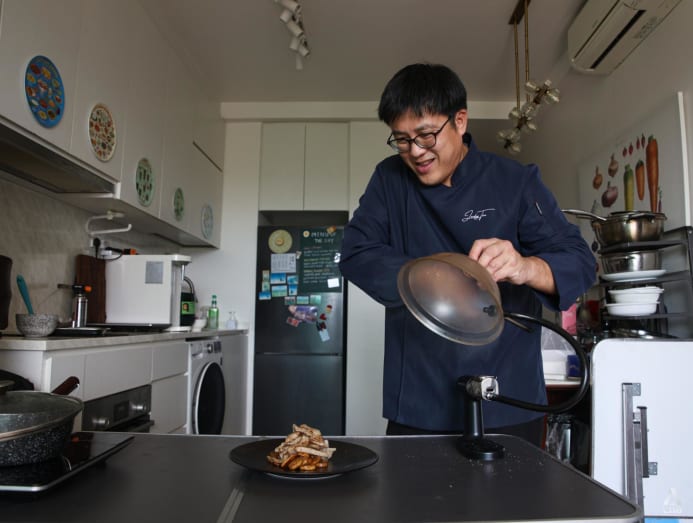 Mr Jacky Tan smoking pieces of pork jowl in his kitchen. (Photo: CNA/Nuria Ling)
Mr Jacky Tan smoking pieces of pork jowl in his kitchen. (Photo: CNA/Nuria Ling)
While many home-based business owners expressed concern that excessive regulation could hinder their ability to operate flexibly and drive up costs, consumers and industry peers have called for stricter regulations for the sector, particularly home-based food businesses.
The strictness of regulations for home-based businesses varies worldwide, sometimes differing by state or city in larger countries like the United States.
For example, in 2015, the state of Wyoming passed the Wyoming Food Freedom Act, allowing residents to sell any kind of food as long as it does not contain meat. Later amendments enabled indirect sales at grocery stores, retail locations and the wholesaling of non-perishable foods, and an annual US$250,000 (S$342,000) sales limit.
In Hong Kong, all businesses, including home-based ones, must register with the Inland Revenue Department within one month of starting operations, and there are funding options for home-based businesses including small business loans and government grants.
In 2021, the Restaurant Association of Singapore called for the home-based food businesses industry here to be subjected to a “robust licensing regime”, after 15 people fell ill with gastroenteritis symptoms after eating food from a home-based bakery.
While Ms Marhamah of Inariku is qualified to safely handle raw food, through training she underwent at Tokyo Sushi Academy in the Japanese capital and attending food safety courses, she does not sell raw seafood options because of the Singapore Food Agency’s (SFA) restrictions for home-based food businesses.
But she doesn’t have any issues with such regulations, agreeing that the industry would be “unruly” without guidelines. She also suggested that food hygiene safety courses, which home-based business owners here are currently encouraged to attend, could be made a mandatory prerequisite to raise industry standards.
In the 2021 parliamentary response, Ms Fu, the minister, said that SFA does not require small-scale home-based food businesses to be licensed as the food safety risks associated with them is low. But the agency is considering the need to make it mandatory for home-based food business owners to undergo food safety training and certification, she added.
In response to CNA TODAY's queries, the SFA said that home-based food businesses keen to expand operations beyond what their homes can support should consider doing so in licensed food premises.
"Licensed food businesses serve a much larger customer base and are therefore required to comply with requirements such as mandatory training for all food handlers and ensure that their premises are appropriately set up and equipped to ensure the sale of safe food," said SFA.
Regulations aside, home-based business owners acknowledged that much work remains to support smaller ventures in navigating inconsistent demand and achieving commercial success on a larger scale.
Chef X, launched by real estate developer Far East Organization, is a platform to showcase home-based cooks that launched in 2024, providing free rental for a limited period. It follows Baker X, a similar initiative launched in 2021 which offers home-based bakers a two- to eight-week residency, which has showcased 35 bakers thus far.
Ms Deborah Tan, director of the commercial group at Far East Organization said these programmes are designed to offer home-based food business owners a chance to receive immediate feedback and guidance from a veteran chef mentor and access commercial-grade equipment, which may not be permitted or accessible in a home-based setting.
"This immersive experience goes beyond a home-based setup, where many rely on domestic kitchen equipment, delivery services and online reviews to assess their offerings," she said.
For Mr Tan of Cheeky Don, a one-month residency at Chef X @ Clarke Quay Central has shown him the limits of his current set-up, and what he might need to do before expanding to a brick-and-mortar store.
“There’s a lot of difference between running a commercial kitchen and working from home. At first, I was told to just prepare 20 portions, but it sold out immediately. The first two weeks, I was adjusting and adjusting, until I was preparing more than 60 portions a day,” said Mr Tan.
While he was encouraged by the strong response for his rice bowls from the office crowd, he said the experience also opened his eyes to the less-pleasant realities of expanding his business beyond the home.
“Running a commercial business is very tiring. I slept two to three hours a day. Rent would be very high, and I would be working very long hours,” Mr Tan added.
While having a retail store may be the ultimate goal for some home-based businesses, others regard the model — with its flexibility and lower operational costs — as a strategy in itself.
For Ms Tisha, the young nail technician, what started as a side hustle is now providing her with practical experience for her ongoing degree in business management.
“I see myself doing (home-based nail manicures) in the future, because I’m passionate about it. To me, it’s not really just about the money. I love bonding with the customers, and seeing my vision come to life,” Ms Tisha said.
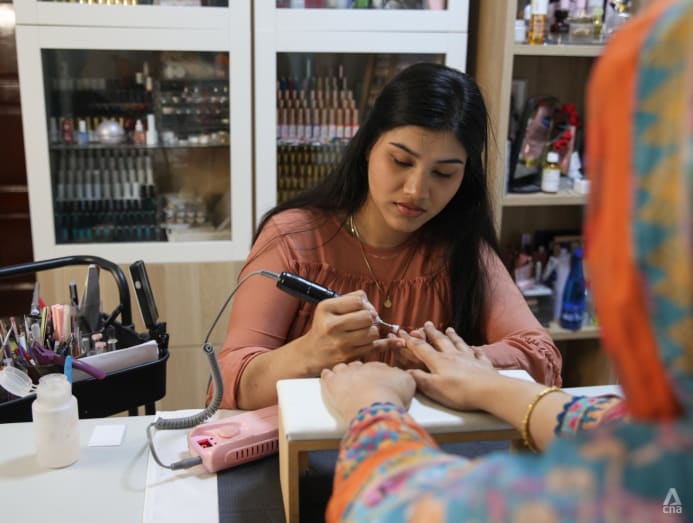 Ms Tasnia Saba Tisha, 21, a university student who runs a home-based nail salon from her bedroom. (Photo: CNA/Nuria Ling)
Ms Tasnia Saba Tisha, 21, a university student who runs a home-based nail salon from her bedroom. (Photo: CNA/Nuria Ling)
Mr Kenneth Yong, 40, a self-taught private dining chef who runs The Mixtape Chef from his flat in Sengkang, traded a stable salary and health benefits from his previous career in the fast-moving consumer goods industry for the creative outlet that his home-based business provides.
While he pivoted to running a brick-and-mortar ice cream shop during the pandemic, he called it the “worst-decision ever”, as he ended up depressed by having to pull long hours to pay staff and high rental costs.
He returned to a home-based private dining model after his two-year lease was up, which allows him to balance time with his family and catering to the fluid demand for dinners, the occasional lunch and cooking classes.
“When I’m doing home-based, I'm much happier, with a much lower cost base, coupled with a more minimalist lifestyle, I have more flexibility and creative freedom,” said Mr Yong.
Still, there remains a lingering concern about the future of the home-based business industry.
“At the back of my mind is the possibility of impending regulation, because there are so many players right now. I’m just most worried (about that), because the way it is right now is beautiful for incubating creative and innovative ideas for the food scene and other industries.
“My only wish is that more home-based business owners self-regulate, read the guidelines and keep the whole industry beautiful,” said Mr Yong.

















.jpg?itok=Ox6HmVBj)




















